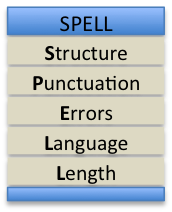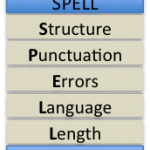Category Archives: Vocabulary
The Case of a Misplaced Modifier–video
7 Money Idioms
What is a cash cow? Why do we say, “Money doesn’t grow on trees” or “Rolling in dough”?
Check out some explanations to these common money idioms:
SPELL—Making Sense of Sentences
 Check out this blog post about writing great sentences:
Check out this blog post about writing great sentences:
http://www.writingandspeakingforbusiness.com/blog/spell-making-sense-of-sentences
Using “you” when writing
At certain times and in certain documents, addressing the reader as “you” is acceptable. When writing a letter, for example, addressing the reader is common. Many of your business documents will be to a specific person and you will use “you” to address your reader.
The problem with addressing the reader as “you” comes when the writer does not mean the reader specifically. “You” is often used to make generalizations but can make for confusing and inaccurate sentences.
For example, the following sample sentence appeared in a memo to a professor:
- I have found that with the general business degree you can find a decent job.
The author is writing to a professor, so it is unlikely that the professor is looking for job opportunities presented by a general business degree. The author either means to generalize or refer to him/herself. Therefore, either of the following examples is more accurate:
- I can find a decent job with a general business degree.
- People with general business degrees can find decent jobs.
Writers should pay careful attention to their intended meaning and use either first person (I, me) or third person (they, people) in their writing. Do you (the reader of this document) mean to address your reader?
photo credit:![]() J E Theriot via Compfight
J E Theriot via Compfight
Assertive Language
In the business world, one wants to appear assertive and confident. Using “hedging” or conditional words undermines the reader’s confidence in the writer.
The most common words that undermine a writer are: seems, appears, maybe. To make your writing more assertive, delete these conditional words. Some examples appear below.
- Not assertive: It appears that the engineering department receives much of the blame.
- Assertive: The engineering department receives much of the blame.
- Not assertive: It seemed like everyone thought there was a different problem.
- Assertive: Everyone thought there was a different problem.
- Not assertive: The XYZ Corporation appears to be very successful.
- Assertive: The XYZ Corporation is very successful.
- Not assertive: The R&D team is pretty much off the hook.
- Assertive: The R&D team is off the hook. (This is terrible vocabulary, however.)
- Not assertive: The first recommendation I would make is to spell check your document.
- Assertive: First, I recommend you spell check your document.
- Not assertive: I think that maybe what the company should do is hire a consultant.
- Assertive: The company should hire a consultant.
Now that you have seen some examples, look for conditional words in your writing and eliminate as many as possible.
Unclear Referents–or Why Does My Paper say “ref”?
Why Does my Paper Say “Ref”?
 Tennessee Journalist via Compfight
Tennessee Journalist via Compfight
To ensure your writing is clear and easy to read, pronouns must clearly refer to a noun in the current or previous sentence. The reader must know what noun the pronoun is replacing. The “ref” designation on an edited piece of writing means the referent is unclear.
A pronoun refers to a noun (he/she, they, them, it etc.)
An antecedent (or referent) is the noun to which the pronoun refers.
Identify the pronoun and antecedent in this sentence:
- Many students are anxious when they have to take an exam.
The pronoun is “they.” “The antecedent is “students.” This sentence is clear.
In this sentence, the reference is unclear:
- Both John and Will loved his new IPod.
The pronoun is “his” but the reader does not know if the “his” is John or Bill. This sentence is unclear because the reader cannot tell who loves the IPod.
Another example shows confusion in sentences in which two or more nouns are possible antecedents. The following sentence is unclear:
- When the president objected to Mr. Carter, he told him to mind his own business.
(Who told whom?)
This revision is clear:
- When the president objected to Mr. Carter, Mr. Carter told him to mind his own business.
Confusion also occurs when the pronoun does not have an antecedent or the antecedent is implied. This sentence is unclear:
- Students should not allow the mixture to boil; so when they do it, watch the temperature gauge.
The “it” in the second clause does not have an antecedent, which makes the sentence confusing. The following revision is correct:
- Students should not allow the mixture to boil; so when conducting the experiment, watch the temperature gauge.
The rules to ensure clear pronoun referents are:
- Do not use “they” when referring to unspecified persons (generalizing); “they” must refer to specific people.
- Terms such as everyone, everybody, anybody, company, committee are singular and take singular pronouns.
- Use “it” and “that” when referring to a specific word or phrase.
- Pronouns must agree in number with their antecedents
- Plural antecedents need plural pronouns
- Incorrect: Each person should follow their major plan.
- Correct: Students should follow their major plan.
- Incorrect: Everybody should plan for their retirement.
- Correct: Everybody should plan for his or her retirement.
- Plural antecedents need plural pronouns
The Lonely This
Writers often use “This” to refer to the subject of the previous sentence. However, using the pronoun “this” alone is sometimes called a Lonely This. A subject should follow a “This.”
A Lonely This looks like:
- This is mine.
- This is likely due to too much freedom.
- This left them feeling inadequate.
In each of these examples, the reader does not know to what the “This” refers. The “This” is lonely because it doesn’t have a subject.
Writers should identify the “This” as in the following examples:
- This textbook is mine.
- This problem is likely due to too much freedom.
- This problem left them feeling inadequate.
In these examples, the “This” is followed by a noun. The more specificity in your writing, the easier it is to read because the reader doesn’t have to re-read sections to determine your subject.
Active and Passive Verbs
Active and Passive voice causes writers many, many problems. In business writing, you want to use active voice because sentences in active voice are more direct and forceful. Active voice sentences clearly identify who is doing the action. This reduces confusion and increases brevity in business documents.
In passive voice, who or what does the action of the sentence is implied, unknown, or comes after the verb in the sentence. Passive voice is often used when a writer wants to deflect blame or criticism, or when the action of the sentence is more important than the doer/actor.
The easiest way to determine if a verb is active or passive is to ask the following two questions:
What is the verb?
Who/what is doing the action (verb)?
If you know who is acting = active voice
If you’re unsure who is acting = passive voice
Are the following sentences active or passive?
1. Companies expect accounting positions to increase in the next ten years.
- What is the verb? Expect
- Who/what is expecting? Companies
- This sentence is active.
2. They have to work with computers.
- What is the verb? Work
- Who is working? “They”
- This sentence is active.
3. The report was left on the desk.
- What is the verb? Left
- Who/what left the report? We don’t know.
- This sentence is passive.
4. Several students were failed because of poor writing.
- What is the verb? Failed
- Who failed the students? We don’t know.
- This sentence is passive.
Once you’ve identified passive verbs, how do you change them to active verbs?
- Identify the verb
- Identify who is doing the action of the verb.
- Name the actor as the subject.
Consider the following examples of passive verbs changed into active verbs.
- I was identified by the MBTI as an IFNJ.
- Verb is “identified”
- Who identified? The MBTI
- Revised: The MBTI identified me as an IFNJ.
- A new program was devised for making automatic payments.
- Verb is “devised”
- Who devised? We don’t know, so we must add or name the subject
- Revised: Technicians devised a new program for making automatic payments. Or: The new program is for making automatic payments.
Now, find the passive verbs in your writing by asking:
- What is the verb?
- Who is doing the action of the verb?
Change the sentence to active voice by naming the actor (who/what does the action of the verb) first in the sentence (before the verb).
Conciseness
Being concise means using as few words as possible to effectively and clearly relay your message.
Throughout most of your education, you have been required to fill a designated number of pages and learned to use a lot of words to fill space.
In business, time is money and hiding your message within long, wordy sentences will cost your company time.
Read this article to learn more about writing concisely.
https://owl.english.purdue.edu/owl/resource/572/1/













